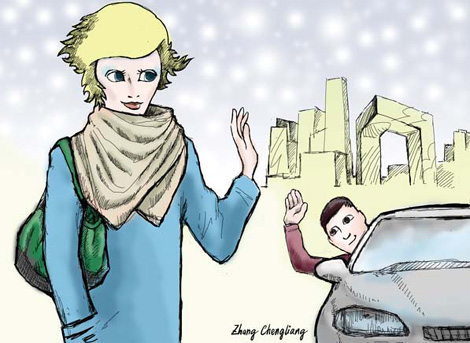Comment
My own tale of two cities
By Christine Laskowski (China Daily)
Updated: 2010-01-20 09:34
 |
Large Medium Small |

The recent snowstorms and below-freezing temperatures were a great reminder of just how enterprising Beijingers are, and how beautifully safe this city truly is.
Waiting in front of my office building one evening hoping for a taxi, I was approached by a couple in a silver car. After a quick negotiation over the price, they drove me home. I didn't have to wait in the freezing cold, and they made a bit of extra money.
But the most remarkable thing for me was that throughout the entire process, I never once felt that my safety was threatened. In fact, I've never ever felt that I was unsafe here, and as both a woman and a foreigner in a city of about 20 million people, that is an unbelievable thing.
I'm originally from the city of Memphis in the southern United States, and the story is a very different one for that city with a population of merely 672,046 according to US Census Bureau figures released in 2008. That's 1/38 the size of Beijing.
There were 11,725 violent-crime incidents reported in Memphis in 2006. Last year, three of the city's precincts showed no improvement from the 2006 statistics, with 123 reported homicides. That averages out to almost one murder every other day.
So when Forbes Magazine's ranked my home city as No 2 on its list of the most dangerous cities in America, neither I, nor anyone from Memphis, was surprised.
Having lived in and traveled extensively around China for almost two years now, the biggest culture shock I experience whenever I return home is tied to feelings of safety.
I return to a world where all of my friends who live in the city have to set their alarm systems before leaving their homes, where I would never walk around downtown alone at night, where I would never ever hop into a stranger's car.
I realize I am only telling part of the story here. It is an unfair comparison to look at the population-to-crime ratio alone. There are other factors involved, such as racial and socio-economic demographics, of course.
But while there's no shortage of wealth in Beijing, there is poverty. And perhaps perceptions of this differ, but I see people with so little every day, all around me - from the men and women who cycle through my neighborhood to collect the garbage, to the couple that run a little shop next door and live with their two small children in the back. Venture just a little off the beaten track in this city, and you'll find yourself in communities of migrant workers who live in shanties scraping by, saving whatever they have to send home to the rural areas.
But then we can cross out the whole poverty-leads-to-crime theory, or where-there's-poverty-there's-crime association. It's simply not true here. Items get left behind in taxi cabs, but possessions are hardly ever stolen, there are rarely any robberies. There is corruption, sure, but what the government as a whole really does right is keep down crime. In two years, I've never had a single incident, or known anyone that's had a problem.
So thanks, Beijing, for being so safe that I'm losing my street smarts.









